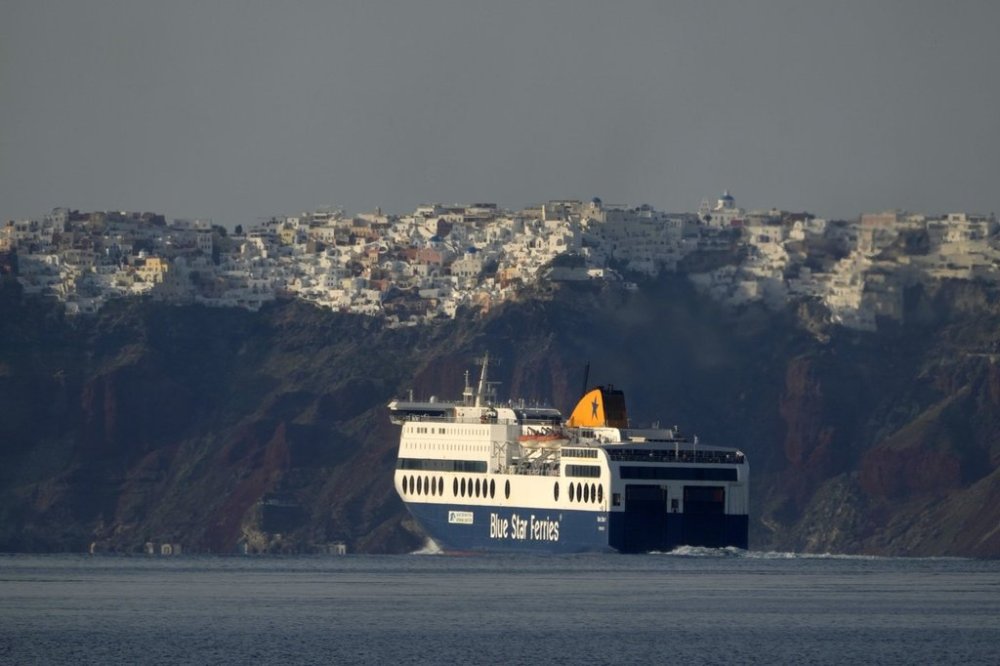Santorini earthquakes are decreasing but outlook is uncertain, top Greek scientist says
Advertisement
Read this article for free:
or
Already have an account? Log in here »
To continue reading, please subscribe:
Monthly Digital Subscription
$0 for the first 4 weeks*
- Enjoy unlimited reading on winnipegfreepress.com
- Read the E-Edition, our digital replica newspaper
- Access News Break, our award-winning app
- Play interactive puzzles
*No charge for 4 weeks then price increases to the regular rate of $19.00 plus GST every four weeks. Offer available to new and qualified returning subscribers only. Cancel any time.
Monthly Digital Subscription
$4.75/week*
- Enjoy unlimited reading on winnipegfreepress.com
- Read the E-Edition, our digital replica newspaper
- Access News Break, our award-winning app
- Play interactive puzzles
*Billed as $19 plus GST every four weeks. Cancel any time.
To continue reading, please subscribe:
Add Free Press access to your Brandon Sun subscription for only an additional
$1 for the first 4 weeks*
*Your next subscription payment will increase by $1.00 and you will be charged $16.99 plus GST for four weeks. After four weeks, your payment will increase to $23.99 plus GST every four weeks.
Read unlimited articles for free today:
or
Already have an account? Log in here »
Hey there, time traveller!
This article was published 17/02/2025 (265 days ago), so information in it may no longer be current.
ATHENS, Greece (AP) — The Greek government’s chief seismologist says the frequency of earthquakes affecting Santorini and nearby islands has eased in recent days, but that the outlook for continued tremors in the coming weeks remains uncertain.
“Unfortunately, for now, we must wait. These seismic sequences do not end quickly. They follow their own timeline,” seismologist Costas Papazachos told state-run ERT radio on Monday.
“Hopefully, this particular sequence will surprise us in a positive way and resolve itself sooner rather than later,” he said.

A state of emergency has been declared on Santorini and the nearby islands of Ios, Amorgos, and Anafi after a swarm of undersea earthquakes this month – sometimes felt every few minutes – prompted thousands of residents and workers to move to the Greek mainland.
Schools on the islands remain closed for a third week, while security services have set up rescue teams and backup power generators as part of precautionary measures.
The government announced Monday that an emergency port facility was being established on Santorini in case of a wide-scale evacuation.
Papazachos, a professor of geophysics at the University of Thessaloniki, currently serves as the representative of two emergency committees that include scientists and officials from government, the military, and emergency services.
He said Santorini, a volcanic island shaped by catastrophic eruptions, did not face danger from its dormant volcano, but noted that magma was affecting the tremors.
“The root cause of the activity is the interaction of tectonic and magmatic processes,” he said. “That does not mean that the molten material – the magma – will manage to break through 8 kilometers (5 miles) of crust and reach the surface, causing a new volcanic eruption.”
Scientists were developing a clearer picture after gathering data from multiple sensors, he said.
“We are monitoring not only seismographs but also numerous other systems that track ground deformation, gas emissions, and satellite data,” he said. “At this moment, I can honestly say we do not have a definitive forecast, as it is too early to assess the current slight de-escalation of seismic activity. We have encountered many surprises.”
Earthquakes of up to magnitude 5.1 were recorded Monday in the undersea area bordered by the four islands under a state of emergency.


